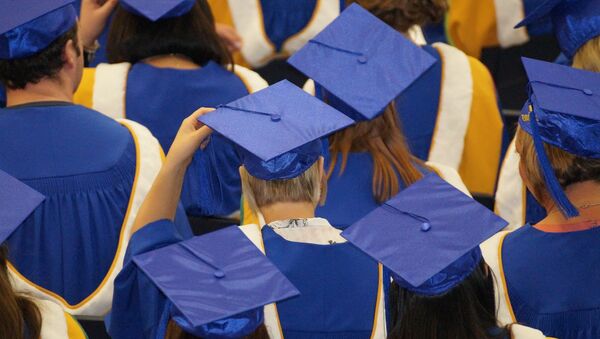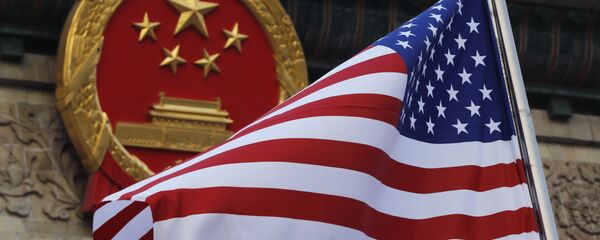Fascinated by the music in the cartoon, Lu told his parents that he wanted become a pianist who could play beautiful music like Tom, the cat, did.
This summer, the 17-year-old student from Xinxiang in Central China’s Henan province got one step closer to his childhood dream, when he was admitted to a high school in San Jose, California, where he could polish his English skills and prepare to apply for the excellent piano program at California State University Stanislaus.
READ MORE: '30,000 Chinese PhD Students' in US: Beijing Targeting Defense Sector — Pentagon
Unfortunately, Lu’s path to pursue his dream of joining a world-class piano program in the United States hit a major roadblock after his visa application to attend the high school in San Jose was denied twice this summer.
"The school in San Jose starts registering new students in two days. I have no chance of going there for the new semester," Lu told Sputnik on Tuesday.
Rising Visa Denials
As trade tensions between China and the United States have continued to escalate in recent months, Chinese students who plan to study in the United States, especially those majoring in hi-tech related fields, have come under tighter scrutiny.
Starting from June 11, Chinese graduate students could only get one-year US visas if they plan to study in fields such as aviation, robotics and high-tech manufacturing, the US press reported earlier. The proposed restrictions reportedly aim to protect the United States against intellectual property theft from China and prevent Beijing from dominating in the field of science and technology in the future.
However, during a dinner with corporate executives at his private golf club last week, US President Donald Trump reportedly said he thinks "almost every student [from China] that comes over to this country is a spy."
Hostility from the Trump administration toward Chinese students seems to have already had an impact on the number of visas by the US embassy in Beijing.
"In previous years, even if your grades are not very good at your university in the United States, you could still have a chance to obtain a visa to go back to school. But this year, it has become very difficult for such students to get a visa to return to school," Zhang Min, a manager at Beijing-based immigration consulting agency Hensel Visa, told Sputnik.
Based on her first-hand experiences with Chinese clients, Zhang estimates the number of cases where an applicant’s visa was denied has jumped by as much as 40 percent this year.
In addition to Chinese students pursuing higher education in the United States, Chinese academics, especially those in the high-tech fields, have also had trouble obtaining a US visa this year.
READ MORE: US Administration Allegedly Mulling Reductions to Cultural Exchange Visas
Zhang gave an example of one of her clients who is a professor teaching aviation at a university in Central China.
"Previously, this client never had trouble getting a US visa. He visited the United States many times and always could receive at least a one-year visa due to the sensitivity of his research field. But this year, the visa officer just denied his application without explanation," she said.
Zhang added that the client is reaching retirement age soon and only wants to go to the United States to visit some friends in the summer.
Altered Future
As for Lu, the high school student, failing to obtain a visa to go study in the United States also brought heavy financial losses to his family, on top of the emotional devastation of an altered career path.
"My family has already paid the $20,000 annual tuition to the high school in San Jose. I don’t know if we can get some of that money back. My parents only run a tea shop in my hometown. I have to rely on them for financial support, as I’m still just a high school student," he said.
After his dream of studying in the US high school was crushed, Lu also had to face the challenge of finding the right Chinese high school that is willing to accept him, a few weeks before the new semester starts in September.
"This [the US visa denial] really created a lot of troubles for my family. The new semester will also start very soon in high schools in China. My parents have been trying very hard to find the right connections to get a Chinese high school to accept me," he said.
Top Chinese Talent
Nevertheless, despite the setback, Lu is determined to continue to pursue his dream of studying at a top music program in the United States in the future.
"The rich educational resources and the culture in the United States are very appealing to me. The music programs in the United States are one of the best in the world. As I don’t have a chance to go there for high school, I will try to enter a top Chinese music institute first and go study in the United States as an exchange student in the future," he said.
Despite US visa restrictions appearing to target Chinese students in hi-tech related fields, it is unlikely for US authorities to turn down talented Chinese students, who are part of the driving forces of innovation in the United States, Zhang, the immigration consultant, suggested.
"For those Chinese students who are sincere in advancing their studies in the United States and have good attitudes, they still have a good chance of obtaining a US visa. The United States will not ‘say no’ to such students," she said.
Lu, the piano student, said failing to obtain a US visa would only motivate him to work harder to become a talented musician who is in high demand in the United States.
"Instead of begging the visa officer for mercy, you have to position yourself to become someone the US president wants to invite to the United States. This will be the true testament of your success," he said.
According to figures from an Open Doors study by the Institute of International Education, the number of Chinese students enrolled at US educational institutions reached 350,755 during the 2016-2017 academic year, accounting for 32.5 percent of all international students in the United States. China remains the top place of origin for international students in US educational institutions, followed by India and South Korea.





